The citi Bike Effect


By Madeleine Thompson
Are Citi Bikes helping or hurting small businesses?
The ongoing conversation about bikes in the city continued on Wednesday, Jan. 25 at a joint meeting of Community Board 8’s small business, street life and transportation committees. About 20 Upper East Siders — relatively few compared to the crowds that have shown up to bike-related meetings in the past — turned out to discuss the impact of Citi Bike on local businesses.
Liz Patrick, vice president of the East 72nd Street Neighborhood Association, presented an informal survey her organization had done of several small businesses that revealed some specific complaints. “There is a gap between the sidewalk and where the docking station is … and trash, dirt and other things seem to accumulate in there,” she said.
Patrick specifically mentioned Best Health Gourmet Deli, at First Avenue and 74th Street, and Primrose Florist at Third Avenue and 71st Street. The former has also had issues with delivery trucks causing gridlock because the store is located between a bus lane and an apartment building, and the delivery trucks must double-park next to the docking station on 74th. She said the other five Citi Bike stations in her neighborhood were “nicely placed.”
According to Patrick, the NYPD has issued Primrose Florist a warning for not keeping the trash-filled gap between the Citi Bike rack and the sidewalk clear. “The police ... told them that it is their responsibility to clean that gap just like it’s their responsibility to clean the sidewalk,” she said. “[The owner] said they’re nervous wrecks. It’s not uncommon to stop working with a customer, come outside and sweep up before they think the police officer might be coming by to give them a ticket.”
No one from the Department of Transportation attended the meeting, and CB8 board members promised to take up the issue with DOT, as well as with the Sanitation and Consumer Affairs Departments. Following an inquiry by Our Town, a DOT spokesperson said NYC Bike Share is accountable for maintaining the stations and the areas around them. “Local business owners are encouraged to contact Citi Bike customer service to report trash buildup at a particular station,” the spokesperson said.
During the time reserved for public comment, some attendees just wanted to discuss their opposition to Citi Bike, and the committee chairs had to remind them to stay on the topic of bikes in relation to small businesses. Last week’s group included those who felt passionately both for and against the bike-sharing program, and the discussion remained civil despite the contentious topic.
“I’m really happy about the bike lanes. It’s going to make it much easier to actually use the Citi Bike system,” said Maggie Subhas, who lives on East 69th Street and Second Avenue. She suggested that the trash accumulation issue could become a community project.
Trisha Shimamura, a member of the transportation committee, credited Citi Bike with helping her find the baker for her wedding cake. “I went in hating Citi Bike but was encouraged to try it out, but I have to tell you that we, personally, have [patronized] more small businesses because of it,” she said. “I do see us … saving money because now neither my fiance nor I buy monthly Metrocards.”
But others lamented the loss of parking space and the lack of knowledge that some bikers seem to have about basic traffic rules. “The city of New York needs to educate people if we’re going to continue in this fairly chaotic fashion of imposing bikes on the general citizenry,” another Upper East Sider said. “I think most bikers don’t realize the danger they are imposing on themselves.”
By the end of 2017, there will be 12,000 Citi Bikes at 750 stations across the five boroughs. The next phase of Citi Bike’s expansion in Manhattan will take place above 110th Street into Harlem and Morningside Heights.
Madeleine Thompson can be reached at newsreporter@strausnews.com